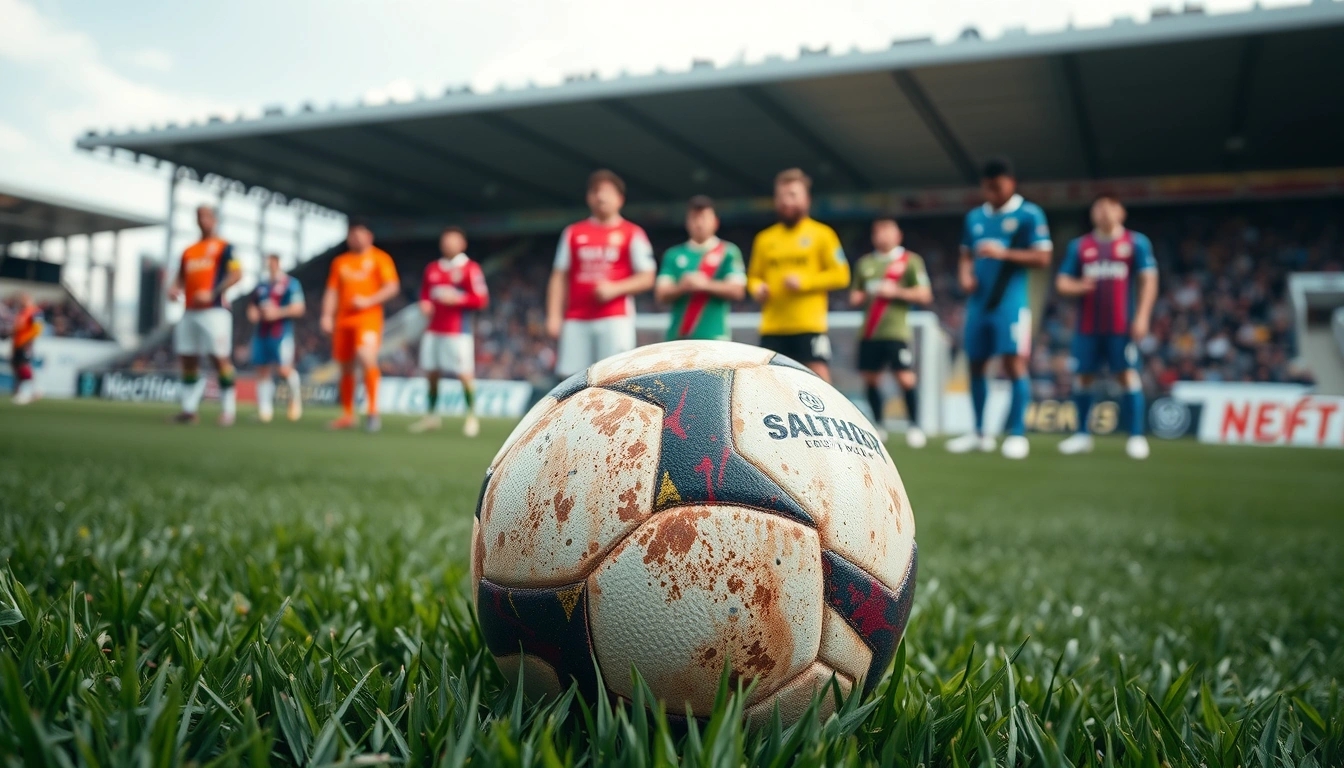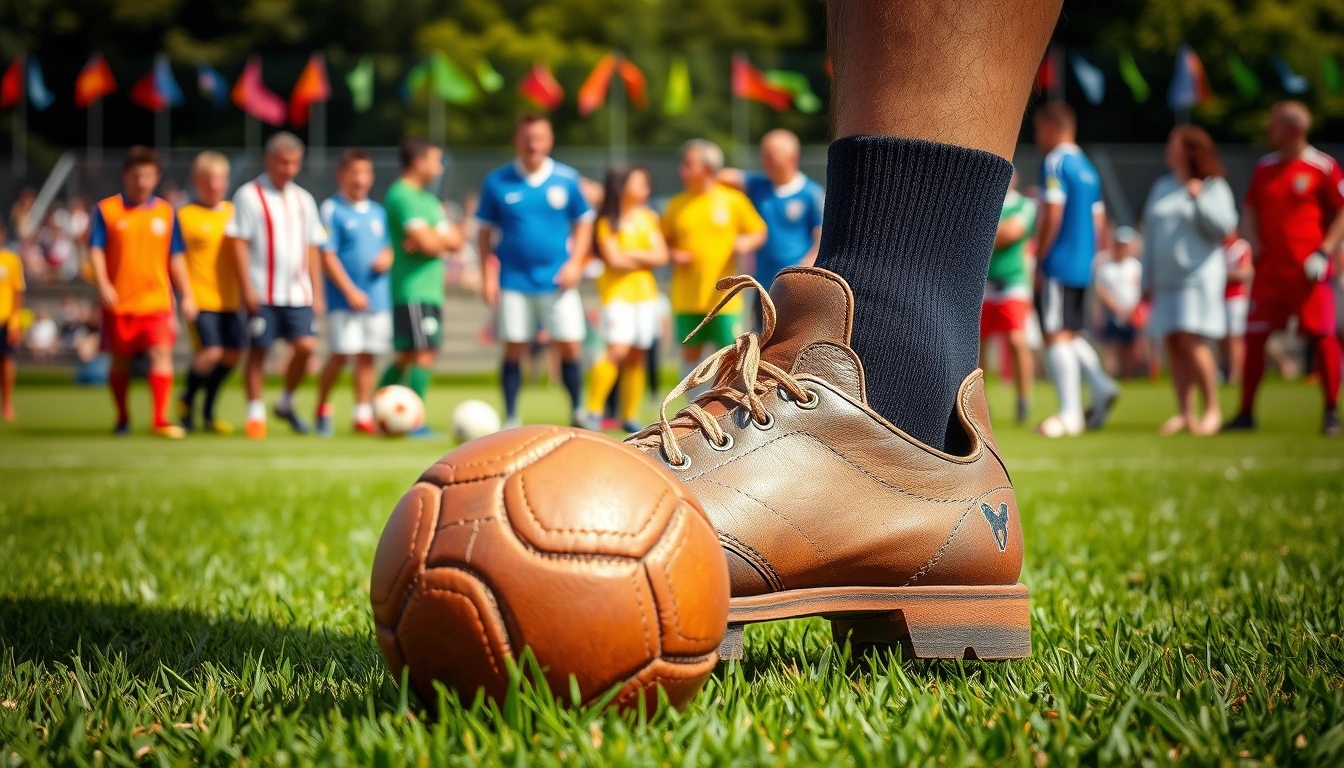Thinking about kicking off a football journey in your 30s? Well, you’re not alone, and guess what? It’s absolutely doable—even if you’ve never kicked a ball before or haven’t played since school. Football isn’t just a young person’s game, and the UK’s women’s football scene is buzzing with opportunities for beginners of all ages. So, if you’re wondering whether it’s too late to start, here’s a down-to-earth guide to help you dive into the sport without the usual overwhelm.
Why start women’s football in your 30s?
First off, your 30s can be a fantastic time to start. You’ve probably got a better sense of yourself, your body, and what you want out of life. Football offers more than just a way to get fit—it’s a social outlet, a stress-buster, and yep, a confidence booster. Plus, it’s a chance to break the monotony of work and family life. Sure, starting something new can be daunting, but the benefits far outweigh the jitters.
- Fitness gains: Cardio, strength, and flexibility all wrapped up in one.
- Community: Meet like-minded women who share your passion or curiosity.
- Mental health: The endorphin rush after a game? Priceless.
Finding the right local club
Alright, so you’ve decided to give it a go. Now, where to start? The UK has a wide range of women’s football clubs—from casual, friendly groups to more competitive teams. The trick is to find a club where you feel comfortable, not judged. Don’t be shy about reaching out—clubs love new players, especially those who bring enthusiasm. Ask about training times, the vibe of the team, and how they support beginners. Remember, it’s not a one-size-fits-all deal.
| Club Type | Level | Typical Commitment | Best For |
|---|---|---|---|
| Social/Community Clubs | Casual | 1-2 sessions/week | Beginners, fun-focused players |
| Local Amateur Leagues | Intermediate | 2-3 sessions + matches | Those wanting a bit more challenge |
| Regional Competitive Teams | Advanced | 3+ sessions + regular matches | Experienced players aiming higher |
Understanding different leagues and levels
The UK’s women’s football scene is layered, from low-key Sunday leagues to more serious regional competitions. Don’t freak out if you don’t know where you fit. Most leagues welcome newcomers and have divisions that cater to all skill levels. It’s perfectly okay to start at the bottom and work your way up—or just stay for the fun of it. The important thing is to get out there and play.
Essential gear and kit for beginners
You don’t need to splash out on the latest boots or flashy kits. Honestly, a decent pair of trainers or football boots, comfortable sportswear, and shin pads are your essentials. Maybe grab some moisture-wicking socks because blisters are a nightmare. If you’re on a budget, start simple and upgrade as you get more serious. The gear isn’t what makes you a player—it’s your passion.
- Football boots (firm ground recommended)
- Shin pads (safety first!)
- Comfortable sportswear
- Water bottle (hydration is key)
Balancing football with work and family
Look, life’s busy. Between work deadlines, family duties, and Netflix binges, finding time for football can feel like juggling flaming torches. But many clubs understand this and offer flexible training schedules. Try to communicate your availability upfront. Even squeezing in one session a week can make a difference. Think of football as your ‘me time’—you deserve it.
Building fitness and avoiding injuries
Starting football later means you’ve got to be smart about it. Don’t go full throttle on day one or you’ll regret it (hello, pulled hamstring!). Warm-ups, cool-downs, and listening to your body are your new best friends. Gradually build up your stamina and strength. If you can, mix in some cross-training like swimming or yoga to keep things balanced.
Quick Tips for Injury Prevention:
- Always warm up and stretch
- Don’t ignore pain—rest if needed
- Stay hydrated and fuel your body well
Finding coaching and training resources
Good coaching can turn a ‘meh’ experience into something you look forward to every week. Many clubs offer beginner-friendly sessions, and local community centres sometimes run football courses specifically for women starting out. Online resources are also a goldmine—YouTube tutorials, fitness apps, and forums can provide tips and motivation. Don’t hesitate to ask questions and seek feedback.
Dealing with nerves and confidence issues
Walking onto the pitch for the first time can feel like stepping into the unknown. You might think, “Will I mess up? Will I fit in?” Spoiler alert: everyone’s been there. The trick is to focus on the fun, not perfection. Remember, football is a team sport—your teammates want you to succeed. Breathe, smile, and know that confidence grows with every kick.
Women’s football culture and community in the UK
It’s not just about scoring goals or winning matches; it’s about belonging to a supportive, vibrant community. Women’s football in the UK has blossomed into a space where friendships are forged, stories are shared, and everyone’s welcome. Whether you’re at a grassroots club or cheering at a professional game, you’re part of something bigger.
Success stories: Women who started late and thrived
Take heart from women who started football in their 30s and went on to achieve amazing things—whether it’s captaining their local team or simply finding joy and confidence in the sport. Their journeys remind us that it’s never too late to chase a new passion.
Common myths and misconceptions
Myth: “You have to be fit to start.” Nope. You get fit by starting.
Myth: “Only young women play football.” Wrong again. The game is for everyone.
Myth: “I’ll embarrass myself.” Everyone starts somewhere, and mistakes are part of the fun.
Next steps: How to get started today
Ready to lace up? Here’s a quick checklist:
- Search for local women’s football clubs online or via community centres
- Contact clubs to ask about beginner sessions
- Get basic gear (boots, shin pads, comfy clothes)
- Set realistic goals—fun first, competition second
- Show up, have fun, and don’t sweat the small stuff
So, what are you waiting for? The pitch is calling, and your football journey can start today—no matter your age or experience. Lace-up, grab a ball, and join the ever-growing sisterhood of women loving football across the UK.
Why start women’s football in your 30s?
Alright, let’s get real for a moment. If you’re in your 30s and thinking, “Should I even bother starting football now?”—the answer is a big, fat YES. It’s never too late. Seriously, this decade might just be the perfect time to lace up those boots and hit the pitch. Why? Because your 30s come with a bunch of perks that make football not just fun but also incredibly rewarding beyond the usual sweat and goals.
First off, there’s the obvious: fitness. But not just any fitness—football offers a dynamic workout that’s way more exciting than slogging it out on a treadmill. Sprinting, dribbling, quick changes of direction… your body gets a full-on party that keeps you agile and strong. Plus, it’s a fantastic way to shake off the stress from work or family life. But hey, if you thought football was just about running around, think again. The mental sharpness it demands? That’s a whole other level. Your 30s often bring better focus and decision-making skills, which means you might actually outsmart those younger players more than you expect.
- Social perks: Football is a brilliant way to meet new people who share your vibe.
- Confidence boost: Nothing like scoring your first goal to make you feel invincible.
- Stress relief: That ball doesn’t judge, and neither do your teammates (well, mostly).
Now, don’t get me wrong—jumping into a sport where many start young can feel intimidating. But here’s the kicker: your 30s often mean you’re more in tune with your body and limits. You’re less likely to push recklessly and more likely to train smart, which means fewer injuries and more enjoyment. Also, the women’s football scene in the UK is exploding with opportunities for beginners of all ages. From casual kickabouts to more competitive leagues, there’s a spot for you.
| Benefit | Why it’s great in your 30s |
|---|---|
| Physical fitness | Balanced approach; less risk of burnout |
| Mental sharpness | Better focus and tactical understanding |
| Social connections | More mature, meaningful friendships |
| Confidence | Life experience helps overcome nerves |
Look, if you’ve been on the fence, consider this your sign. Football in your 30s is about more than just the sport itself—it’s a chance to challenge yourself, meet a cracking bunch of people, and add a bit of zest to your routine. So why wait? The pitch is calling, and trust me, it’s never too late to answer.
Quick tips to get started:
- Find a local women’s club that welcomes beginners.
- Don’t stress about skill—focus on fun and fitness.
- Invest in some comfy boots, but no need for top-dollar gear right away.
- Be patient with yourself; progress takes time.
- Enjoy every moment, even the awkward ones!
In the end, your 30s could be the golden era to start football. So, grab that ball, get out there, and show yourself what you’re made of.
Finding the right local club
Alright, so you’ve decided to give women’s football a go in your 30s—brilliant! But now comes the real head-scratcher: which club? It’s like trying to pick a favourite ice cream flavour when there’s a whole freezer aisle staring back at you. The UK is bursting with football clubs, but finding one that feels just right—welcoming, flexible, and a good fit for your lifestyle—can be a bit of a mission. Don’t worry, though, we’ve got your back with some no-nonsense tips to help you navigate this maze.
First off, think about what you want from the club. Are you after a chill, social vibe where the focus is more on fun and less on winning? Or are you secretly dreaming of scoring that winning goal in a competitive league? Knowing your priorities will save you a ton of time. Some clubs are all about hardcore training and matches every weekend, while others are more casual, maybe training once or twice a week with a strong community feel. Pro tip: Don’t be shy to ask current players or coaches about the atmosphere before committing. A quick chat or even a trial session can reveal a lot.
- Location matters: Pick a club close enough that you won’t dread the commute after a long day at work. Trust me, nothing kills motivation faster than a 90-minute trek each way.
- Training times: Look for clubs that offer sessions fitting your schedule. Evening or weekend training might be the only way to keep football alive alongside your busy life.
- Club vibe: Check social media or websites to get a feel for the club’s personality. Are they welcoming to newbies? Do they celebrate diversity? These little things count.
| Factor | Why It Matters | Questions to Ask |
|---|---|---|
| Skill Level | Ensures you’re not out of your depth or bored stiff | Is there a beginner or mixed-ability squad? |
| Coaching Quality | Good coaching better experience and improvement | Are coaches qualified? What’s their approach? |
| Social Events | Builds team spirit and makes football more fun | Do they organise socials or community events? |
| Costs | Can add up, so important to know upfront | What are membership fees and kit costs? |
Now, here’s a bit of a reality check: some clubs might not be as welcoming as you hoped. You might get the odd “Are you sure you’re up for this?” look or feel a bit like the new kid at school. It happens. Don’t let that put you off. The right club will embrace you for who you are, not just how fast you run or how many goals you score. Persistence pays off. Try a few clubs if you have to—think of it as dating, but for football. You’ll find your perfect match.
Before you jump in, also consider checking out local football associations or community centres. They often have listings or can recommend clubs that are beginner-friendly and have flexible schedules. Websites like the FA’s official page or Meetup groups can be surprisingly helpful.
- Tip: Bring a friend along for moral support. It makes those first sessions less nerve-wracking and way more fun.
- Heads up: Some clubs require you to have basic kit or insurance—ask about these details early to avoid surprises.
In the end, finding the right club is less about ticking every box perfectly and more about finding a place where you feel comfortable, challenged in a good way, and excited to turn up week after week. So, lace up those boots, keep an open mind, and get ready to join a community that’s as passionate about football as you are.
Remember: It’s your journey, your pace. The right club is out there—just waiting for you to kick off.

Understanding different leagues and levels
So, you’re thinking about jumping into women’s football in the UK? Brilliant choice! But before you lace up those boots, it’s worth getting your head around the whole league and level system. It can seem a bit like a maze at first — casual Sunday kickabouts, proper leagues, regional battles — where on earth do you fit? Well, let’s break it down without the jargon and confusion.
First off, not everyone’s aiming to be the next Lucy Bronze or Ellen White (though if you are, good luck!). The beauty of UK women’s football is that there’s a place for everyone, whether you’re just after some fun, fitness, or a bit of friendly competition.
| League Type | Description | Typical Commitment | Skill Level |
|---|---|---|---|
| Sunday Leagues | Casual, often social games played on weekends. Great for beginners or those who just want to enjoy the game without pressure. | Low – usually once a week | Beginner to Intermediate |
| Local Amateur Leagues | More organised, with regular fixtures, sometimes midweek training. Suitable for players wanting a bit more structure and challenge. | Medium – 2-3 sessions a week | Intermediate |
| Regional Leagues | Competitive football with higher standards. Teams travel around the region for matches, often requiring commitment and fitness. | High – multiple training sessions + matches | Intermediate to Advanced |
| National Leagues | Top-tier amateur and semi-professional levels. Think National League, FA Women’s Championship, and beyond. | Very High – intense training, travel, and matches | Advanced |
Now, don’t let the word “competitive” scare you off. Plenty of clubs in regional and local leagues welcome players who are new or getting back into football. It’s all about finding the right vibe — some teams are ultra-serious, while others are more about camaraderie and having a laugh.
- Sunday Leagues: Perfect if you want to dip your toes in without a massive time commitment. Expect mixed abilities, lots of fun, and maybe the odd questionable referee decision.
- Local Amateur Leagues: A step up, where training starts to matter and you might find yourself sweating buckets in midweek sessions.
- Regional Leagues: Here’s where things get a bit more serious. Travel becomes part of your routine, and the competition sharpens.
- National Leagues: For those who want to push their limits. This level demands dedication but offers the chance to play some really top-notch football.
If you’re in your 30s and just starting out, Sunday or local leagues are often the sweet spot. They give you a chance to build fitness, skills, and confidence without turning your life upside down. Plus, many clubs have teams specifically for beginners or women returning after a break — so don’t be shy to ask!
Quick tip: When scouting for clubs, ask about the league they play in, training frequency, and the general team atmosphere. It’ll save you from turning up to a squad that trains five nights a week when you can barely make one.
In the end, the UK’s women’s football scene is pretty much a buffet — pick what suits your taste, appetite, and lifestyle. Whether you want to kick back with mates on a Sunday or chase glory in a regional league, there’s a spot waiting for you. So, get out there and find your pitch!
Essential gear and kit for beginners
Alright, so you’ve decided to jump into women’s football in your 30s — fantastic! Now, before you sprint onto the pitch like a pro (or trip over your own feet), let’s chat about the gear you actually need. Spoiler alert: you don’t have to break the bank on shiny boots or the latest tech-wear. Sometimes, keeping it simple is the smartest play.
First things first: boots. Yes, they matter. But no, you don’t need the fanciest, flashiest cleats on the market. A decent pair of football boots that fit well and offer good grip will do wonders. Avoid buying boots just because they look cool or because a celebrity player rocks them. Comfort beats style any day when you’re dodging tackles or chasing the ball. If you’re unsure, try on multiple pairs, walk around, maybe even jog a bit in them before committing. Remember, blisters are the enemy!
| Gear Item | What to Look For | What to Skip |
|---|---|---|
| Football Boots | Good fit, proper grip, ankle support if needed | Overpriced brands, boots designed for other surfaces |
| Shin Pads | Comfortable, certified protection | Cheap flimsy ones that don’t cover well |
| Kit (Jersey & Shorts) | Breathable fabric, correct size | Heavy cotton, tight or loose fits |
| Socks | Knee-length, cushioned | Regular socks that slip down |
Next up, shin pads. Honestly, don’t skimp on these. They’re your best friends when someone inevitably boots the ball a little too close to your shins. Cheap shin pads that barely cover your leg or slip around are just asking for trouble. Look for ones that fit snugly and meet safety standards. Trust me, your future self will thank you.
Now, what about the kit? Jersey, shorts, socks — it’s tempting to just grab whatever’s lying around, but a proper kit can actually make you feel like you belong on the pitch (psychology is a thing, folks). Opt for breathable, moisture-wicking materials. Cotton might seem comfy but it soaks up sweat and turns heavy — not ideal when you’re running your heart out. And socks? Go for knee-length football socks that hold your shin pads in place and prevent annoying slippage.
- Extras worth considering: A good water bottle (hydration is key!), a small first aid kit for minor scrapes, and maybe some grip-enhancing gloves if you’re playing goalkeeper or just like feeling fancy.
- What to avoid: Overloading your kit bag with unnecessary gadgets or expensive gear that you won’t use. Keep it practical!
Look, the bottom line here is: you don’t need to be decked out like you’re starring in the World Cup final your first day out. Focus on essentials that keep you comfortable and safe. Once you’re hooked and playing regularly, upgrading gear can be part of the fun — until then, just get out there and enjoy the game.
Quick checklist for beginners:
- Properly fitting football boots- Certified shin pads- Breathable jersey and shorts- Knee-length football socks- Water bottle- Optional: basic first aid kit, gloves (if needed)
So, lace up, gear up sensibly, and get ready to kick off an exciting new chapter. Football’s waiting — and trust me, it’s way more fun than stressing over the fanciest boots in the shop window!
Balancing football with work and family
Let’s be honest, trying to squeeze football training and matches into an already packed schedule feels like trying to fit a square peg in a round hole. Between work deadlines, family dinners, and that never-ending laundry pile, finding time for football can seem downright impossible. But hey, if you’re passionate about the game, it’s not about having time — it’s about making time. Easier said than done, right? Here’s the lowdown on juggling football alongside your other commitments without losing your mind.
First up, prioritization is your best mate here. No one expects you to be at every single training session or match, especially when life throws curveballs (hello, sick kids or surprise overtime!). Be honest with your team and coach about your availability. Most clubs appreciate transparency and will work with you to find a balance. Remember, football is meant to be fun, not another stress factor.
- Tip #1: Block out your football time in your calendar like it’s a non-negotiable meeting. Treat it seriously, but don’t beat yourself up if something comes up.
- Tip #2: Use your commute or lunch breaks to catch up on football tactics or watch quick training videos. Every little bit helps.
- Tip #3: Lean on your support network — partners, friends, or family who can help with childcare or errands on match days.
| Challenge | Practical Solution |
|---|---|
| Work conflicts with evening training | Speak with your employer about flexible hours or remote work options on training days. |
| Family commitments on weekends | Coordinate with your team to swap match days or attend fewer games when needed. |
| Feeling too tired after a long day | Prioritize rest, but consider light stretching or a short walk to stay connected to fitness. |
Now, let’s talk about mental juggling. It’s not just your calendar that’s bursting — it’s your brain, too. Sometimes you’ll feel guilty for spending time away from family or stressed about missing work tasks. That’s normal. The trick is to reframe football as a way to recharge your batteries, not an extra chore. When you’re on the pitch, try to be fully present. Forget about emails or dinner plans for that hour. It’s your time to breathe, laugh, and kick some ball.
And hey, don’t be shy about setting boundaries. Saying “no” to extra shifts or skipping a social event to make a training session isn’t selfish — it’s self-care. Your well-being matters, and football can be a powerful outlet to keep you sane.
Quick checklist for balancing football:- Communicate your schedule clearly with coaches and family.- Use tech tools (calendars, reminders) to stay organized.- Accept that some weeks will be busier than others.- Celebrate small wins: a good training session, a fun match, or just showing up.- Remember: It’s about enjoyment, not perfection.
In the end, balancing football with work and family is a messy, imperfect dance. Some days you’ll nail it, other days you’ll drop the ball (literally and figuratively). But if you keep at it, you’ll find your rhythm — and maybe even inspire others juggling the same chaos. So, lace up, show up, and don’t forget to have a bit of fun amidst the madness. After all, that’s what football’s all about.

Building fitness and avoiding injuries
So, you’ve decided to start playing football in your 30s—good on you! But here’s the thing: jumping straight into training like you’re 20 again? Not the smartest move. Your body’s got its own rhythm now, and smart training is the secret sauce to staying fit and injury-free. Let’s break down how you can boost your fitness safely without ending up sidelined with a twisted ankle or worse.
First off, patience is key. You’re not a pro athlete (yet), so don’t expect to run a full 90 minutes without gasping for air on your first go. Start slow and steady. Incorporate low-impact cardio exercises like brisk walking, swimming, or cycling to build up your endurance. These activities are kinder to your joints and help build a solid aerobic base.
- Warm-up and cool-down: Never skip these. A proper warm-up increases blood flow and loosens muscles, reducing injury risk.
- Strength training: Focus on core muscles, legs, and hips. Strong muscles support joints and improve balance.
- Flexibility exercises: Stretch regularly, but don’t bounce. Yoga or Pilates can be your new best mates here.
| Injury | Cause | Prevention Tips |
|---|---|---|
| Hamstring Strain | Sudden sprinting or overstretching | Proper warm-up, gradual sprint training, hamstring strengthening |
| Sprained Ankle | Twisting or uneven ground | Strengthen ankle muscles, wear supportive boots, balance exercises |
| Knee Ligament Injury | Sudden twists or tackles | Strengthen quads and hamstrings, avoid sharp turns without preparation |
Now, here’s a little insider tip: listen to your body. If something hurts more than usual soreness, don’t just “walk it off.” Ice it, rest it, and if it’s persistent, see a physio. Ignoring pain is a one-way ticket to long-term problems.
Also, don’t underestimate the power of cross-training. Mixing up your routine with swimming or cycling can improve overall fitness without overloading the same muscles. This variety helps prevent overuse injuries, which are sneaky because they creep up slowly.
Sample Weekly Training Plan for Beginners:-------------------------------------------Monday: Light cardio + stretchingTuesday: Strength training (legs & core)Wednesday: Rest or gentle yogaThursday: Interval running (start small)Friday: Strength training + balance exercisesSaturday: Football practice (light drills)Sunday: Rest or active recovery (walk/swim)
Remember, building fitness is a marathon, not a sprint. And hey, setbacks happen. Twisted ankle? Missed a week? Chill, it’s normal. The goal is to keep moving forward without breaking yourself.
In short, smart training means you’re not just getting fitter—you’re setting yourself up for a long, injury-free football journey. So lace up, but do it with care. Your 30s self will thank you when you’re still kicking goals years down the line.
Finding coaching and training resources
Jumping into women’s football in your 30s? Well, buckle up because good coaching isn’t just a cherry on top—it’s the whole cake. Seriously, a decent coach can turn a hesitant beginner into someone who actually enjoys getting kicked around (figuratively, hopefully). But where on earth do you find these mythical creatures called “supportive coaches” and quality training sessions? Let’s break it down, no fluff, just the real talk.
First off, don’t expect to stumble onto a world-class coach at your local park just by waving a football around. It’s about digging a bit. Your best bet? Start local. Community centres, grassroots clubs, and regional football associations often have beginner-friendly programs specifically designed for women starting late. These places usually have coaches who’ve seen it all and get that you’re not there to score a hat trick on day one—you’re there to learn and have fun.
| Resource Type | Where to Find | What to Expect |
|---|---|---|
| Local Football Clubs | Community centres, local council websites, social media groups | Beginner sessions, friendly coaching, social matches |
| Football Associations | FA Women’s Football Hub, county FA websites | Official coaching courses, certified coaches, training camps |
| Online Platforms | YouTube tutorials, coaching apps, online courses | Flexible learning, drills, fitness routines |
Now, about those coaches—look for ones who are not just barking orders but actually listen. You want someone who understands that starting football in your 30s means you might need a bit more patience, a lot more encouragement, and maybe a few laughs along the way. Don’t shy away from asking about their experience with adult beginners. If they roll their eyes or say “you’ll catch up eventually,” run (but politely).
- Tip 1: Join beginner-friendly training sessions or women-only football groups. These environments are usually more supportive and less intimidating.
- Tip 2: Check if the club or coach offers trial sessions. It’s a no-strings way to see if the vibe suits you.
- Tip 3: Utilize online coaching resources when in-person options are scarce—there’s a surprising amount of quality content out there.
Also, don’t underestimate the power of peer coaching. Sometimes the best trainers are your teammates who’ve been around the block. Sharing tips, practicing drills together, or just having a natter about tactics can boost your confidence and skills more than you’d expect.
Practical Insight:- Start with 1-2 coached sessions per week.- Supplement with solo practice or online drills.- Keep a training journal to track progress and setbacks.
At the end of the day, finding your coaching groove is a bit like dating—you might have to kiss a few frogs before you find the one who’s right for you. But once you do, football in your 30s won’t just be a hobby; it’ll be your new passion. So, get out there, ask questions, and remember: every expert was once a beginner who didn’t quit.
Ready to find that coach? Start local, stay curious, and keep kicking.
Dealing with nerves and confidence issues
Stepping onto the football pitch for the first time—especially in your 30s—can feel like walking into a lion’s den. The jitters hit hard, your heart races, and suddenly, every eye feels like it’s laser-focused on your every move. Sound familiar? You’re not alone. Nerves are a completely normal part of starting something new, but the good news is, they don’t have to hold you back.
First things first: accept that feeling nervous is actually a good sign. It means you care, you want to do well, and your brain is gearing up for action. Instead of fighting those butterflies, try to channel them into energy. Think of it like a pre-game pep talk in your head: “I’ve got this. I’m here to learn and have fun.”
- Tip 1: Breathe. Sounds basic, right? But deep, slow breaths can calm your racing heart and clear your mind.
- Tip 2: Focus on small wins. Maybe it’s just making a pass or keeping up with the group for a few minutes. Celebrate those moments.
- Tip 3: Remember, everyone started somewhere. Even the pros were once beginners fumbling on the pitch.
Now, about building self-confidence—this isn’t an overnight magic trick. It’s a slow burn, a bit like your fitness levels. Confidence grows with practice, and sometimes, with a healthy dose of messing up and laughing about it. If you’re worried about looking silly, here’s a secret: most people are too busy worrying about themselves to judge you harshly.
| Action | Why it helps |
|---|---|
| Set realistic goals | Keeps expectations manageable and progress measurable |
| Practice regularly | Familiarity breeds confidence |
| Find a supportive teammate or coach | Encouragement and feedback build self-belief |
| Visualize success | Prepares your mind for positive outcomes |
Here’s a little anecdote for you: I once saw a woman in her mid-30s join a local women’s league, trembling like she was about to face a firing squad. Fast forward a few months, and she was not only passing confidently but also cracking jokes with teammates. Confidence? It came from showing up, falling a few times, and getting back up.
Oh, and don’t underestimate the power of mental prep. Before a game or training, try a quick mental checklist:
- What’s my goal today? (e.g., enjoy, learn, improve a skill)- What’s one thing I’m proud of from last time?- How can I support my teammates?- What’s one thing I want to try or improve?
Finally, remember this: football is as much about having fun as it is about competition. If the nerves start to feel overwhelming, remind yourself why you started. Maybe it’s the thrill, the community, or just the chance to do something for yourself. Whatever it is, hold onto that.
In summary: nerves are normal, confidence grows with action, and the pitch is a place to learn—not to be perfect. So lace up, take a deep breath, and give it your best shot. The rest? It’ll come with time.

Women’s football culture and community in the UK
Jumping into women’s football in the UK isn’t just about lacing up your boots and chasing a ball around a pitch — it’s stepping into a whole vibrant, buzzing world of people who genuinely care. Seriously, the culture here is something else. It’s like finding a second family where everyone’s got your back, whether you’re a newbie or a seasoned pro. And let’s be honest, that kind of support? It’s priceless.
Now, you might think football’s just about the game itself, but nope, it’s way bigger. The community is what truly sets it apart. From grassroots clubs tucked away in small towns to massive city teams, there’s this amazing sense of camaraderie that runs deep. People cheer each other on, share laughs (and the odd rant about that missed goal), and celebrate every tiny victory. It’s a culture built on respect, encouragement, and a shared passion for the sport.
- Inclusivity: Women’s football in the UK prides itself on being open to all. Age, background, skill level — none of it really matters. You’ll find players who started at five, and others who only picked up a ball in their 30s or 40s. Everyone’s welcome.
- Community Events: Clubs often organize socials, fundraisers, and match-day gatherings that feel more like a big family reunion than just a sports event.
- Support Networks: Beyond just football, many clubs offer mentoring and support, helping women balance life, work, and sport.
| Aspect | What it Means for You |
|---|---|
| Friendships | Expect to meet some lifelong mates who’ll cheer you on and pick you up after tough games. |
| Empowerment | Football isn’t just physical; it’s a confidence booster. The community celebrates every personal win. |
| Shared Passion | Whether it’s a local Sunday league or a regional cup, the love for the game binds everyone. |
But hey, it’s not always sunshine and roses. Sometimes the culture can feel a bit cliquey, especially when you’re new. Don’t let that throw you off — most clubs are super welcoming once you show up a couple of times. It’s like breaking into any tight-knit group; takes a bit of patience and a few awkward hellos. Just remember, everyone was the newbie once.
One of the coolest things about women’s football in the UK is how it’s constantly evolving. The community pushes for better facilities, more recognition, and equal opportunities. You’re not just playing a game; you’re part of a movement. And that’s pretty darn inspiring.
Tips for getting involved in the community:- Attend local matches, even as a spectator.- Join club socials to meet players off the pitch.- Volunteer at events to get a feel for the scene.- Don’t be shy — ask questions and share your story.
To sum it up, the culture and community around women’s football in the UK is what makes it truly special. It’s messy, lively, supportive, and sometimes a little chaotic — just like life itself. So, if you’re thinking about kicking off your football journey, know that you’re stepping into more than just a sport. You’re joining a tribe.
So, what are you waiting for? The pitch is calling, and the community’s ready to welcome you with open arms.
Success stories: Women who started late and thrived
So, you think football’s just for the youngsters? Think again. There’s a whole squad of women out there who kicked off their football journeys in their 30s — yes, 30s! — and absolutely smashed it. These aren’t just feel-good tales; they’re real-deal stories of grit, laughs, and unexpected triumphs. Let’s dive into a few of these inspiring journeys that prove it’s never too late to lace up those boots.
Meet Sarah, the Late Bloomer
Sarah didn’t touch a football seriously until she hit 34. “I was always the ‘too busy’ type,” she says, “but one day, I just thought, why not?” Starting at a local Sunday league, she stumbled, tripped, and yes, even got a few red cards (oops!). But fast forward three years, and Sarah is now captain of her team, leading with a mix of fierce determination and infectious humor.
- Key takeaway: Starting late means you bring maturity and a fresh perspective to the game.
- Challenge: Balancing family life and training wasn’t easy, but Sarah credits her supportive partner and flexible club hours.
Jasmine’s Journey: From Couch to Competitive
Jasmine’s story is the classic “I never played a day in my life” turned competitive player. At 31, she joined a women’s football club just for fun, but soon she found herself hooked. “I was rubbish at first,” she admits, “but the coaches were patient, and the team was welcoming.” Now, she’s playing in a regional league, and her fitness has skyrocketed.
| Before Football | After 2 Years |
|---|---|
| Could barely run 1km | Completes 5km runs regularly |
| Zero football knowledge | Understands tactics and plays midfield |
| Mostly sedentary lifestyle | Active, energetic, and motivated |
Why These Stories Matter
It’s not just about scoring goals or winning trophies (though that’s pretty sweet too). It’s about finding joy, community, and a sense of achievement at an age when many think the window’s closed. These women show that football can be a powerful tool for self-discovery and confidence-building.
- Community spirit: Joining a club means instant access to a supportive network.
- Health benefits: Improved fitness, mental health, and stress relief.
- Breaking stereotypes: Who says you can’t start a new sport in your 30s?
Practical insights if you’re thinking “Can I do this?”
- Start small: Try a casual kickabout or a beginner’s session.
- Gear up sensibly: You don’t need top-of-the-line boots right away.
- Find the right club: Look for welcoming teams that value fun and inclusivity.
- Don’t sweat perfection: Everyone starts somewhere, and mistakes are part of the game.
In the end, these stories aren’t just about football. They’re about women reclaiming their time, challenging expectations, and proving that passion doesn’t come with an expiry date. So, if you’ve been sitting on the sidelines wondering if it’s too late, take a leaf out of Sarah and Jasmine’s book — it’s never too late to kick off something amazing.
Ready to write your own story? The pitch is waiting, and who knows? Maybe your success story is just a few kicks away.
Common myths and misconceptions
around joining women’s football in your 30s? Oh, where do we even start? If you’re sitting there thinking, “Nah, I’m too old, too unfit, or just plain clueless to start now,” then hold up — it’s time to bust those myths wide open. Because, honestly, these excuses are just stories we tell ourselves to stay comfy on the sidelines.
First off, the biggie: “I’m too old to start playing football.” Seriously? Football isn’t just for teenagers or twenty-somethings. Loads of women in their 30s, 40s, and beyond have kicked off their football journeys and are loving every sweaty, thrilling minute of it. Age is just a number, not a stop sign. Your 30s can actually be a sweet spot — you’ve got more patience, better focus, and probably a stronger sense of self than you did in your wild twenties.
Then there’s the classic “I’m not fit enough.”b> Yeah, football demands some stamina, but guess what? You don’t need to be a marathon runner or a gym junkie to join a local team. Many clubs have beginner sessions tailored for all fitness levels. Plus, football itself is a fab way to get fit without it feeling like a chore — running, laughing, scoring goals, and making mates all rolled into one.
| Myth | Reality |
|---|---|
| Too old to start football | Many women start in their 30s, 40s, even later, and thrive. |
| Must be super fit already | Clubs welcome all fitness levels; football helps build fitness gradually. |
| Only competitive players allowed | There are plenty of casual and social leagues for fun-focused players. |
| Need expensive gear to begin | Basic kit is enough; fancy boots can come later if you want. |
Another one that sneaks in is the idea that “football is only for competitive athletes.”b> Nope. The UK’s women’s football scene is super diverse. From chill Sunday leagues where the main goal is a good time, to more serious regional competitions, there’s a spot for everyone. You don’t have to be aiming for the pros to enjoy the game or be part of a team.
And let’s not forget the gear myth. People often think you need to drop a fortune on boots, kits, and all the fancy stuff before you even kick the ball. Truth is, you just need some comfy trainers, appropriate clothing, and a ball to start. The rest? Optional upgrades when you’re ready.
- Myth: I’ll be the worst player on the pitch.
- Reality: Everyone starts somewhere. Most teams are welcoming and supportive.
- Myth: I don’t have time for training and matches.
- Reality: Many clubs offer flexible schedules and casual sessions.
- Myth: I’ll get injured if I’m not young and fit.
- Reality: Proper warm-ups and gradual training reduce injury risk.
Look, if you’re hesitating because of any of these myths — just remember, the only thing truly holding you back is that voice in your head. Women’s football in the UK is growing fast, and clubs want YOU, no matter your age or experience. So, lace up, show up, and give it a go. You might surprise yourself.

Next steps: How to get started today
So, you’ve made up your mind — it’s time to kick off your women’s football journey in your 30s. First off, congratulations for deciding to dive into something new and exciting! It might feel a bit daunting, like stepping onto the pitch for the first time without a clue which way to run, but trust me, every footballer started somewhere. Here’s a practical, no-nonsense guide to get you lacing up those boots and chasing the ball in no time.
- Step 1: Do a little homework — Start by scouting out local clubs. Google is your friend here, but don’t just rely on websites. Check out Facebook groups, community noticeboards, or even ask around at your workplace or in your neighbourhood. Many clubs have beginner-friendly or social teams specifically for women starting out, so look for those keywords: “inclusive,” “beginner,” “social,” or “women’s only.”
- Step 2: Reach out and ask questions — Don’t be shy! Drop an email or message to the club’s contact person. Ask about training times, fees, what to wear, and how competitive the team is. It’s better to get the lowdown upfront than turn up expecting a casual kickabout and find yourself in a semi-professional bootcamp.
Here’s a quick table to keep your options clear:
| Type of Team | Commitment Level | Typical Training Frequency | Good For |
|---|---|---|---|
| Social/Beginner | Low | Once a week | Learning basics, meeting new people |
| Amateur League | Medium | 2-3 times a week | Improving skills, competitive matches |
| Competitive/Regional | High | 3-5 times a week | Serious training, tournaments |
Now, before you rush out and buy the flashiest boots on the market, remember: comfort beats style every time. You’ll want a decent pair of trainers or football boots that fit well, shin pads, and some comfy sportswear. Many clubs even lend gear for your first few sessions, so check if that’s an option before splashing the cash.
Another golden nugget of advice: don’t expect to be Messi overnight. It’s perfectly normal to feel clumsy, get tired quickly, or even mess up basic passes. The key is showing up consistently and having a laugh along the way. Football is as much about the community as it is about the sport itself.
- Step 3: Get your body ready — If it’s been a while since you last played or exercised regularly, start with some light cardio and stretching. There’s no need to go full marathon runner, but a bit of preparation helps avoid injuries that could put you off before you even get started.
- Step 4: Find coaching resources — Many clubs offer beginner coaching sessions, or you can find online tutorials tailored for women starting football later in life. Don’t underestimate the power of YouTube and local community centres.
- Step 5: Show up and enjoy — The hardest part is often just turning up. Once you’re there, soak in the atmosphere, make friends, and remember why you started: for fun, fitness, and a fresh challenge.
Finally, here’s a quick checklist to keep you on track:
✔ Research local clubs with beginner-friendly teams✔ Contact clubs and ask about training and costs✔ Get basic gear (boots, shin pads, sportswear)✔ Start light fitness prep to avoid injuries✔ Look for coaching or training resources✔ Commit to showing up regularly✔ Have fun and don’t take yourself too seriously
Ready to lace up? The ball’s in your court now — or should we say, on your boot. There’s no perfect moment to start; the best time is right now. So grab those boots, head to your nearest pitch, and join the growing community of women proving that football is truly for everyone, no matter your age.
Frequently Asked Questions (The title must be written in English.)
- Is it really possible to start playing women’s football in my 30s?
Absolutely! Your 30s can be the perfect time to begin. Many women find that starting football later brings fresh excitement and motivation. It’s never about age, but passion and commitment. Plus, football is fantastic for fitness, friendships, and fun!
- How do I find a local club that’s beginner-friendly and welcoming?
Start by searching online for community clubs or women’s football groups near you. Don’t hesitate to visit or attend a trial session to feel the vibe. Look for clubs emphasizing inclusivity and support—these places feel more like a team family than just a sports group.
- What level of football should I expect to join as a beginner?
The UK offers a range from casual Sunday leagues to competitive regional tournaments. Beginners usually start in social or recreational leagues where the focus is on enjoyment and learning rather than intense competition. It’s like dipping your toes in before diving deep.
- Do I need expensive gear to start playing?
Nope! While quality boots and comfortable clothing help, you don’t need top-tier gear initially. A decent pair of trainers, shin guards, and breathable sportswear will get you going. Think of it as investing wisely, not splurging unnecessarily.
- How can I balance football with my busy work and family life?
It’s all about smart scheduling and setting priorities. Choose clubs with flexible training times or weekend matches. Communicate openly with your family and work about your football goals—they’ll likely cheer you on once they see your passion!
- What’s the best way to build fitness and avoid injuries starting late?
Start slow and listen to your body. Incorporate warm-ups, stretching, and strength exercises into your routine. Consider working with a coach or trainer who understands beginners to guide you safely. Remember, consistency beats intensity when building fitness.
- Where can I find quality coaching and training resources?
Look for local clubs that offer beginner sessions or community programs. Online platforms and apps also provide drills and tutorials tailored for newcomers. Don’t underestimate the power of a supportive coach who can boost both your skills and confidence.
- How do I overcome nerves or confidence issues on the pitch?
Feeling nervous is natural! Start by practicing with friends or in low-pressure environments. Focus on small wins and remind yourself why you started. Confidence builds with every kick, pass, and game—think of it as growing your football muscle.
- What makes the women’s football community in the UK special?
It’s a vibrant, inclusive culture full of encouragement and camaraderie. Beyond the game, it’s about friendships, empowerment, and shared passion. Joining means becoming part of a supportive sisterhood that celebrates every player’s journey.
- Are there real success stories of women starting football in their 30s?
Definitely! Many women have started late and gone on to enjoy competitive play, coaching roles, or simply a healthier lifestyle. These stories prove it’s never too late to chase your football dreams and thrive both on and off the pitch.
- What common myths should I ignore about starting women’s football later?
Forget the idea that you’re “too old” or “not fit enough.” Football welcomes all skill levels and ages. Another myth is that only professionals belong on the pitch—wrong! Football is for everyone, and starting late is just a new chapter, not a limitation.
- How do I take the first step to start playing today?
Simple! Search for local clubs or beginner sessions online, reach out to them, and show up. Don’t overthink it—grab your gear, bring your enthusiasm, and dive in. The first kick is always the hardest, but also the most exciting.












